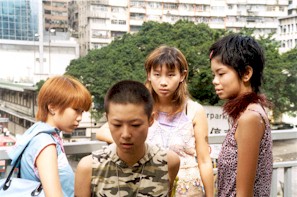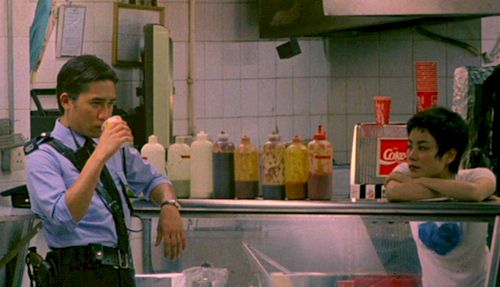缺席的全球城市

In Michelle Huang’s analysis, Wong Kar-wai’s 1994 classic Chungking Express is seen as the director- flâneur’s attempt to represent an authentic image of Hong Kong by focusing on the everyday realities of places such as Chungking Mansion and Midnight Express. Inevitably, what is missing in this picture is the dazzling global space, visible only when it is the airport or the trendy bar in Central – place filled with frustration, loss and crushed ‘California Dreaming’. To Huang, this ‘absent dual city’ can point to the detached gaze of the director- flâneur who shows little interest in critiquing the polarized global city. But more important, it also reveals the complex dialectics between ordinary, lower class city-dwellers and the global space. ‘The invisible is omnipresent’, as Huang puts it, so even though the spectacular lies outside, physically adjacent yet intangible, it nevertheless dominates the daily experience of ordinary Hong Kong people. Their vision, dream, yearning, loneliness, frustration, resistance, and numbness, as the four ‘walkers’ in Chungking Express poignantly epitomize, all have to do with the rapidly changing global space and the grand narrative that globalization promises everyone a prosperous future, which turns out little more than mere thin air. [1]
In my view, then, by dodging the all-to-familiar image of HK’s skyline, and rendering the omnipresent invisible, Wong Kar-wai has successfully avoided a superficial account of the city, instead, transforming the global city’s profound psychological impacts on its local inhabitants into brilliant cinematic representation. And the film, with that attentive flâneur’s gaze lingering on a few individuals and places, somehow managed to deliver a specific but universal message that many of us (post)modern city-dwellers can relate to.
Here Lau Kwok-Cheung’s 2000 film Spacked Out presents an interesting difference. Unlike in Chungking Express, where the characters constantly come back to the same place again and again (a technique of repetition frequently employed by Wong Kar-wai), Lau’s camera follows the female protagonists into the streets of Tuen Mun and Mong Kok, into karaoke bars, shopping malls, their classroom and homes, yet curiously, none of these places appear more than once in the film. Without a nodal point like Midnight Express, Spacked Out is therefore a play of four teenage girls acting against a forever drifting backdrop. The kaleidoscopic cityscape seems no difference than the background images we select when we do sticky-back photos (大头贴): hyper-real, unattached, cut off from any inherent connection with the characters, it implies the flâneurie of these girls as one of the homeless, the nomadic, and the outcast. Their lack of engaged relationship with the city space speaks of their own identities more than anything else. So if the repetitive return to Midnight Express, OK convenience store, street market, cop 663’s apartment, and California restaurant in Chungking Express is essential to elucidating the temporal-spatial-psychological effects of the global city, the one-way journey of Cookie, Banana, Sissy and Bean Curd is necessary, too, in order to show how their access to even the most ordinary space of Hong Kong is denied.
In this sense, it is not unreasonable to think that the global space in Chungking Express is only absent to be present at a much deeper level; whereas in Spacked out, it is, truly and totally absent. I remember near the end of the film, after a series of misadventures and Cookie’s nightmarish abortion, the girls are on the bus back home, when there is this up-angle shot of the flashy neon lights hanging over the streets of Mong Kok. Pretty much a clichéd image of Hong Kong, it nonetheless is significant. For what is shown here does not have much to do with the monumental global space as in Central or Tsim Sha Tsui; it is rather a place where ordinary, lower-middle class people go for shopping and entertainment. And yet it is a space that simultaneously fascinates and alienates these four teenage girls living on the periphery of the city (Tuen Mun). While the distance that we are supposed to feel in Chungking Express is that between the two Californias, here in Spacked Out it is the distance between Tuen Mun and Mong Kok that we painfully grasp as the bus passes under the glittering signs. Moreover, not only is the global reality physically far away from the everyday experience of the characters, even their tiniest hope of dreaming a global dream suffers. As Cookie’s library excursion exemplifies, she is denied the right to simply look at the global images in that tourist book on Japan. Conversely, it is almost represented as a sign of hope, when the film ends with Cookie and the book (thanks to Lai-Yi who borrowed it for her) in her bedroom. Is the film saying that a global dream is the starting point of a new life? What does this imply? And does all of this have anything to do with globalization at all? Those are questions that one may continue to explore.
[1] See Huang, Tsung-yi Michelle. Walking Between Slums and Skyscrapers: Illusions of Open Space in Hong Kong, Tokyo, and Shanghai. Hong Kong: HKU Press. 2004


2 条评论:
真好!
只是英语读起来……
对于我这样的人来说,英语阅读总是与真理隔三层。但是正因为隔了三层,英语写作对于我来说就是一种保护了。
我也觉得,用读英文的感觉很隔膜。
当然,主要原因是英语水平有限。
不过,用英文表述中国的种种,总是很有种“他者”的味道。镜像有些扭曲和变位。
发表评论